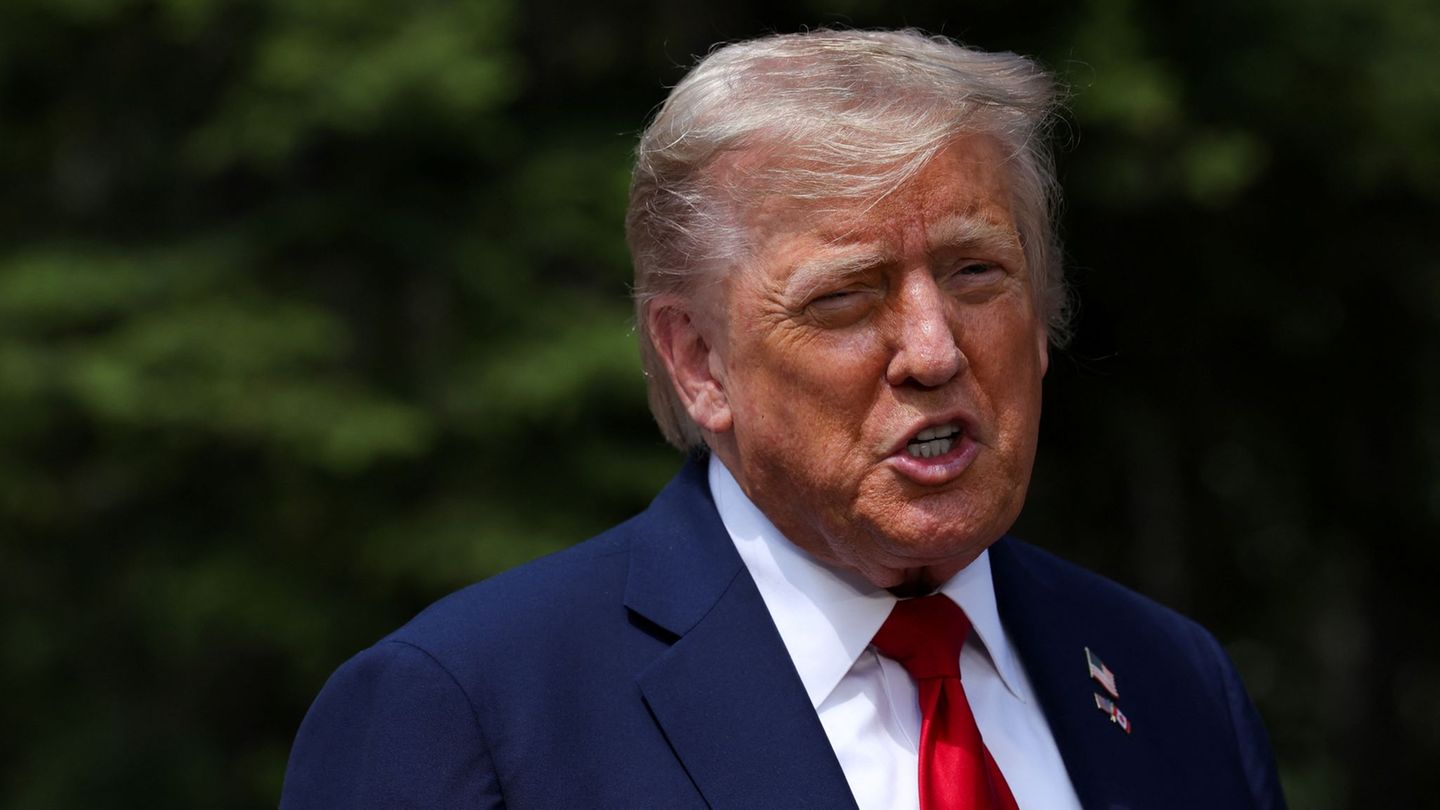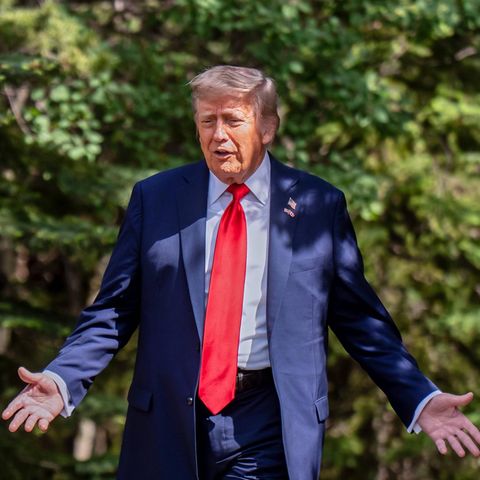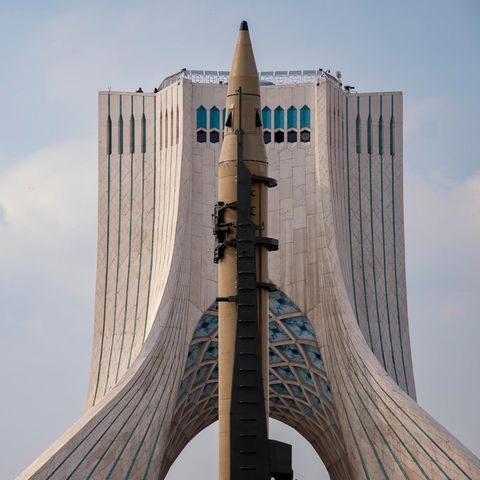International
Trump’s G7 exit and the scenarios for his Middle East mission
Copy the current link
Add to the memorial list
The conflict between Israel and Iran presents Donald Trump the most difficult consideration for a US president: war or not?
How things go on in the Middle East depends above all on one: Donald Trump. The US President has a key role in the conflict between Israel and Iran because of the military power of the United States. And that is exactly what the Republican demonstrates in front of the world.
The 79-year-old travels from the G7 summit in Canada early and leaves the other heads of state and government, who wanted to find a common line with him to the new war in Middle East. In the end, there is no more than a short statement with the smallest common denominator. Trump, the commander-in-chief of the US armed forces, who does not think much of multilateralism and has a soft spot for solo proceeds, makes it clear: he makes his essential decisions to go on the Middle East alone.
The Republican doesn’t think much of multilateralism and has a soft spot for solo and affronts. Shortly after entering his government machine Air Force One in Canada, he spreads a social media post in which he coins France President Emmanuel Macron and explains that he does not travel to Washington to achieve a ceasefire between Israel and Iran, but “something much bigger”. Trump doesn’t reveal more. He mysteriously pushes: “Wait it off!”
Macron had said in advance with a view to Trump’s departure that an offer for ceasefire and encounters and conversations had been submitted. Trump apparently didn’t like that. The Frenchman is always wrong, he etches.
Does Trump indicate that the United States could possibly intervene militarily? Or that he not only worked towards a ceasefire, but also at a permanent war end, a new nuclear deal with the Tehran and an end to the Iranian nuclear program? Everything unclear.
At the moment, a lot indicates that Trump wants to keep the United States militarily out of the conflict, strives for a negotiating solution – and considers a nuclear deal with Iran to be possible. But it is not clear whether he can avert a military conflict for the United States in the end.
As a precaution, the US military strengthened its presence in Middle East. And Trump sends cryptic warnings to the Iranians: A call to all residents of Tehran to leave the city. Impending signs of a possible US strike or a bluff to urge Iran to talks? Trump likes in the role of someone who puzzles the world.
In view of Trump’s often erratic and leaking politics, it is also not excluded that he has not yet committed himself to one way. An overview of the various possible scenarios:
The United States is drawn into war against its will
Iran, as the main supporter of Israel, sees the USA in the conflict. If the Iranian leadership arranges retribution strokes against American bases in the Middle East-or in the zeal of the battle without real intentions to make US goals in the region-then it would be unthinkable that the United States does not resound itself.
Trump has made it clear several times that the US military would react with all hardness in such a case – “to an unprecedented extent”. This would make a completely new and dramatic escalation level. At the moment it doesn’t look like the – weakened – Iran wanted to lie with the United States.
The United States decides to get into the war
With his major attack against Iran, Israel pursues the goal of preventing the country from developing nuclear weapons. According to experts, however, certain nuclear systems in Iran are so deep underground that so-called bunker breakers bombs would be necessary for attacks on it that only the United States have. US equipment also needs to transport them: namely B-2 and B-52 bombers. Some experts therefore argue that Israel cannot achieve its war goal without active military support from the Americans.
Should Trump order that the US military aggressively participates in the attacks on Iranian nuclear facilities, that would also be an escalation of completely new quality. But it doesn’t look like that at the moment either.
The US government rejected reports of alleged American attacks against Iran as “wrong” and emphasized that its own soldiers in the Middle East only stated that they were defending themselves if necessary. The news page “Axios”, citing government circles, reported that Trump’s team had announced several partners in the Middle East that they were not planning to actively interfere with war as long as no US goals were attacked.
The United States keeps out militarily
Trump has made it clear in many cases that he does not want to lead the USA into new wars. Military conflicts somewhere in the world do not match his “America First” course. The Republican relies on martial rhetoric and upgrading the military, but rather with the aim of deterrent, as he claims. Shortly before the G7 summit, Trump said with a view to Iran and Israel: “Sometimes you have to fight it out.”
However, Trump is not located when the Middle East is in flames, the allegation of loss of control attaches him and would shoot energy prices around the world, which in the end also met his voters at home. Therefore, military abstinence is an option, but political does not do anything.
The United States rely on negotiations with Iran
Trump’s previous speeches all interpret in this direction. Since the start of major attack on Iran, Trump has emphasized that a peace deal between the two sides is possible and that Tehran may be more ready for negotiations on his nuclear program in view of the higher pressure. On the edge of the G7 summit, he said that the Iranians wanted to talk and make a deal. Tehran is “practically already at the negotiating table”. He expects an agreement. “You want to make a deal, and as soon as I am gone, we will do something.”
The self -appointed “Dealmaker” Trump has been trying to limit the Iranian nuclear program on the negotiating channel for months in order to prevent Tehran from building nuclear weapons – in return for a loosening of the drastic sanctions against the country. With the mediation of the Gulf State of Oman, there were direct conversations between Washington and Tehran. After the military escalation between Israel and Iran, a planned further round of talks was initially canceled.
Now, according to Trump, Iran wants to return to the negotiating table. Tehran could make it a prerequisite for the United States keeping out militarily and Israel sets its attacks.
Dpa
km
Source: Stern
I have been working in the news industry for over 6 years, first as a reporter and now as an editor. I have covered politics extensively, and my work has appeared in major newspapers and online news outlets around the world. In addition to my writing, I also contribute regularly to 24 Hours World.







